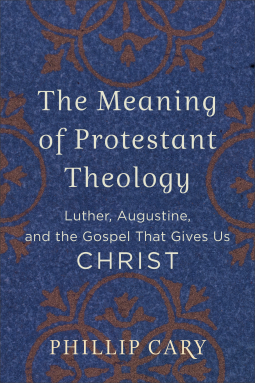
The Meaning of Protestant Theology
Luther, Augustine, and the Gospel That Gives Us Christ
by Phillip Cary
This title was previously available on NetGalley and is now archived.
Send NetGalley books directly to your Kindle or Kindle app
1
To read on a Kindle or Kindle app, please add kindle@netgalley.com as an approved email address to receive files in your Amazon account. Click here for step-by-step instructions.
2
Also find your Kindle email address within your Amazon account, and enter it here.
Pub Date Jun 18 2019 | Archive Date Jul 31 2019
Baker Academic & Brazos Press | Baker Academic
Talking about this book? Use #TheMeaningOfProtestantTheology #NetGalley. More hashtag tips!
Description
Available Editions
| EDITION | Other Format |
| ISBN | 9780801039454 |
| PRICE | $36.00 (USD) |
| PAGES | 400 |
Average rating from 1 member
Featured Reviews
 Floyd J, Reviewer
Floyd J, Reviewer
My first thought as I began to read the opening pages of Phillip Cary’s book “The Meaning of Protestant Theology” was that I had picked up a boring, poorly written book that would be difficult to recommend for an average reader.
That was my impression of the introduction - I thought I was looking at a book written for the very intelligent, scholarly reader, a class into which I do not place myself. I read all the introduction and my opinion did not change. It did not seem fair, however, to judge a book solely by its introduction, so I began chapter 1. I found a readable, interesting essay discussing the work of Plato as assimilated by early Christian writers. This sets the foundation for the book which is designed to follow the thoughts of Plato to Augustine to Luther and the Reformation.
The book is readable and interesting, unlike the introduction. The book will be of interest to those interested in the development of Protestant (Lutheran) theology through history - though the writer clearly states that he has no desire of leaving the reader a devotee of Luther’s teaching; the author clearly states that he is Episcopalian. Not a systematic theology, but clearly rooted in the discipline of historical theology.
Though not knowledgeable in this field, I found the book interesting and relatively easy to read as, to me, an introduction to historical theology. The book probably would not find a home in most local church libraries, though individual pastors with an interest in pre-Christian philosophy, early Christian theology, and the development of early Protestant thought may find it of interest. Most seminaries, both Protestant and Catholic, would find a place for this book in their collections as it begins by exploring the connection between Platonism and Augustine and ends by exploring the connection between Plato, Augustine, and Luther.
______________
This review is based on a free electronic copy provided by the publisher for the purpose of creating this review. The opinions expressed are my own.



